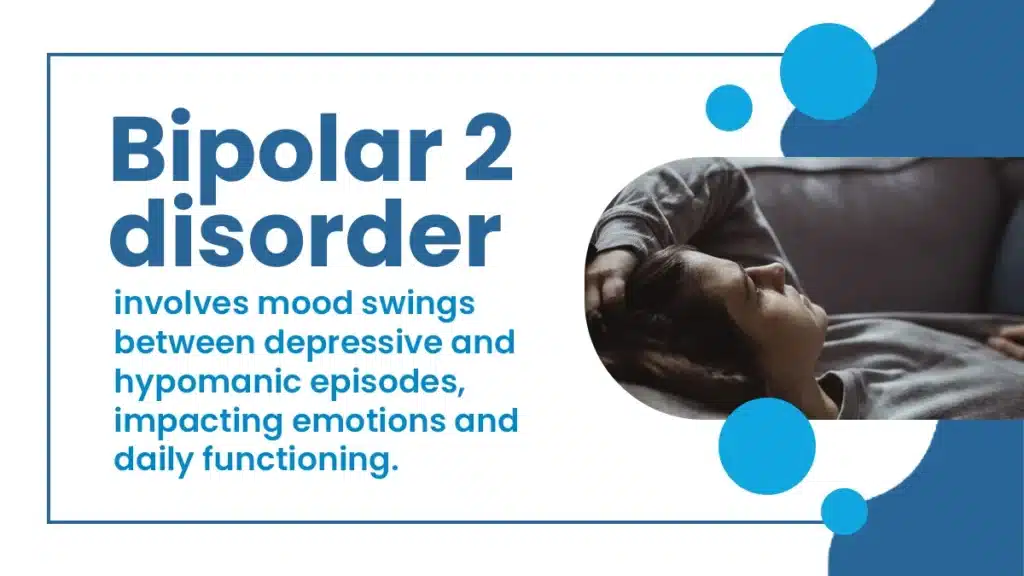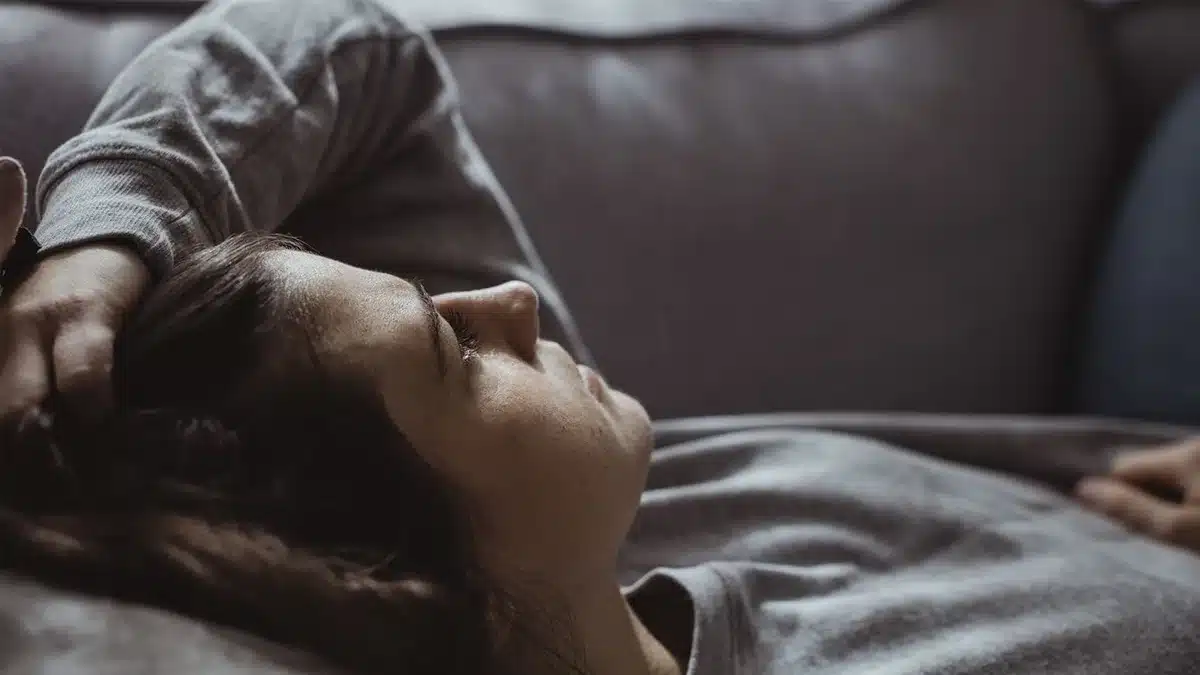Bipolar 2 disorder is a mental health condition characterized by recurring episodes of depression and hypomania, a less severe form of mania.
Unlike bipolar 1 disorder, individuals with bipolar 2 experience milder manic episodes, often marked by high energy levels and impulsivity. The depressive phases, however, are more prolonged and can significantly impact daily functioning.
In the article, we will delve into the details of bipolar 2 disorder, exploring its symptoms, causes, and available treatment options.
Key Takeaways
Bipolar 2 disorder is a mental disorder characterized by mood swings, from hypomanic highs to depressive lows. Here is what you need to know:
- While both involve mood swings, bipolar 1 is marked by severe mania, while bipolar 2 features hypomania.
- Bipolar 2 disorder stems from a complex mix of factors and shows up in the form of hypomanic and depressive episodes.
- Various treatment protocols are available to manage bipolar 2 disorder, including medication and psychotherapy effectively.
Are you struggling with symptoms of bipolar disorder? Contact The Haven Detox-South Florida at (561) 328-8627 for effective mental health care.

Understanding Bipolar 2 Disorder
Bipolar 2 disorder is a mental disorder characterized by cycles of depressive episodes and hypomanic episodes. It is considered a subtype of bipolar disorder, a manic-depressive illness, which is a broader category of mood disorders that involve extreme mood swings.
Here are the common symptoms of hypomania and depressive episodes in bipolar 2 disorder:
Hypomanic Episode Symptoms
During an episode of hypomania, individuals with bipolar 2 disorder experience:
- Elevated or Irritable Mood: Individuals experience an unusually upbeat, energetic, or irritable mood.
- Increased Energy and Activity: A noticeable increase in energy levels and goal-directed activity.
- Decreased Need for Sleep: The person may feel rested or not feel the need for sleep after very little sleep.
- Racing Thoughts: Rapid thought processes, often accompanied by an inability to concentrate.
- Grandiosity: An inflated sense of self-esteem or importance.
- Talkativeness: Increased speech, rapid speech, or pressure to keep talking.
- Distractibility: Difficulty focusing on one task as attention is easily diverted to unrelated stimuli.
- Impulsivity: Engaging in activities with a high potential for painful consequences, such as excessive spending, reckless driving, or risky sexual behavior.
Depressive Episode Symptoms
Symptoms of depression episode in bipolar 2 disorder manifest as:
- Depressed Mood: Persistent feelings of sadness, emptiness, or hopelessness.
- Loss of Interest or Pleasure: Marked decrease or loss of interest in daily activities.
- Significant Weight Changes: Unintended weight loss or gain, accompanied by changes in appetite.
- Sleep Disturbances: Insomnia or hypersomnia, difficulty falling asleep, or excessive sleeping.
- Psychomotor Agitation or Retardation: Restlessness or slowed movements and thoughts.
- Fatigue or Loss of Energy: A feeling of tiredness or a lack of energy almost daily.
- Feelings of Worthlessness or Excessive Guilt: Ongoing and irrational feelings of worthlessness or guilt.
- Difficulty Concentrating: Problems with focus, attention, and decision-making.
- Suicidal Thoughts: Frequent thoughts of death, suicidal ideation, or suicide attempts.
Remember, the severity and duration of symptoms can vary among individuals, and not everyone with bipolar 2 disorder will experience the same set of symptoms.
The Difference Between Bipolar 1 and Bipolar 2 Disorder
Bipolar 1 and bipolar 2 disorder are two different types of bipolar disorder, a mental illness characterized by intense mood changes, including episodes of mania and depression. Here are the key differences between the two:
Nature of Mood Episodes
One main difference between the two subtypes is the nature of mood episodes. Individuals with bipolar 1 disorder experience a full manic episode marked by extreme highs, grandiosity, and impulsivity. Depressive episodes also occur. In contrast, bipolar 2 disorder primarily involves hypomanic episodes, which are less severe than full mania, and depressive episodes.
Severity of Mania
The severity of manic episodes is a key factor separating the two subtypes. Bipolar 1 disorder is characterized by severe mania that often requires hospitalization due to its intensity and potential for erratic behavior. On the other hand, bipolar 2 disorder entails hypomanic episodes, which are milder, shorter in duration, and generally do not necessitate hospital care.
Duration of Episodes
Another key difference lies in the duration of mood episodes. Bipolar 1 episodes, whether manic or depressive, tend to last for a significant period, often weeks to months. In contrast, bipolar 2 depressive episodes endure for at least two weeks, while hypomanic episodes persist for a shorter duration.
Impairment in Functioning
Both subtypes can lead to impaired functioning, but the degree varies. Bipolar 1, with its more severe manic episodes, tends to cause significant impairment in occupational and social functioning. In contrast, bipolar 2 individuals may experience functional impairment during depressive episodes, but the impact is generally less profound than in bipolar 2 disorder.
Remember, either subtype of bipolar disorder can have a significant impact on daily functioning, relationships, and overall quality of life. Therefore, seeking professional help for an accurate diagnosis and appropriate treatment is essential.
Causes and Risk Factors of Bipolar 2 Disorder
While the exact cause of bipolar disorder is not fully understood, various factors are believed to contribute to its development. Here’s an overview of the possible causes and risk factors of bipolar 2 disorder:
Biological Factors
Biological influences, including genetic predisposition and imbalances in neurotransmitters like serotonin and dopamine, play a significant role in the development of bipolar 2 disorder. Clinical research suggests that having a family history of bipolar disorder increases the risk.
Psychological Factors
Psychological factors can contribute to the manifestation of bipolar 2 disorder. Major life changes, traumatic events, trauma, or chronic stress may trigger severe episodes. In addition, personality traits, such as high levels of neuroticism or impulsivity, can increase vulnerability to the disorder.
Environmental Factors
The environment in which an individual lives can impact the course of bipolar 2 disorder. Unstable family dynamics, childhood adversity, or a lack of social support may contribute to the development and exacerbation of symptoms of bipolar 2 disorder.
Medical Conditions
Certain medical conditions can be associated with a higher risk of developing bipolar disorder. Hormonal imbalances, thyroid dysfunction, and neurological disorders may contribute to the manifestation of bipolar 2 disorder.
Medication and Substance Use
The use of certain medicines and substances, such as antidepressants or stimulants, may trigger manic or hypomanic episodes in individuals predisposed to bipolar 2. Substance abuse, including alcohol, illicit drugs, and recreational drugs, can exacerbate the symptoms and complicate the course of the disorder.
Remember, the interplay of these factors can vary among individuals, and not everyone with these risk factors will develop bipolar 2 disorder.
Diagnosis for Bipolar 2 Disorder
The diagnosis of bipolar 2 disorder involves a comprehensive assessment by mental health professionals, typically a psychiatrist or a clinical psychologist. Here is an overview of the diagnosis process for bipolar 2 disorder:
Clinical Interview
A thorough clinical interview is usually the first step. The clinician will gather information about the patient’s medical and psychiatric history, including symptoms, duration, and previous diagnoses or treatments.
Diagnostic Criteria
The diagnosis of bipolar 2 disorder is based on specific criteria outlined in the Diagnostic and Statistical Manual of Mental Disorders (DSM-5). To be diagnosed with bipolar 2, the individual must have experienced at least one hypomanic episode and one major depressive episode.
Mood and Symptom Tracking
Some clinicians may ask individuals to keep a mood chart or diary to track their daily mood fluctuations, sleep patterns, and any potential triggers. This information can provide valuable insights into the nature and pattern of mood episodes.
Medical Evaluation
Physical health plays a role in mental health, and certain medical conditions or medications can contribute to mood symptoms. A physical examination and laboratory tests (such as blood tests) may be conducted to rule out any underlying medical issues.
Psychological Testing
Psychological tests may sometimes be administered to assess cognitive function, personality traits, and emotional well-being. These tests can provide additional information to support the diagnosis.
Collateral Information
Information from family members, close friends, or significant others may be sought to gain a broader perspective on the individual’s behavior, mood, and overall functioning.
Once the assessment process is complete, the mental health professional or doctor will provide a bipolar disorder diagnosis and work with the individual to develop an appropriate treatment plan, which may include a combination of medication, psychotherapy, and lifestyle changes.
Treatment Options for Bipolar 2 Disorder
Effectively managing bipolar 2 disorder involves a comprehensive approach, combining various treatment modalities tailored to individual needs. The following treatment options are most commonly utilized:
Medication
Medications such as mood stabilizers, antipsychotics, and antidepressants are commonly prescribed to address the severe mood swings associated with bipolar 2. Careful monitoring and collaboration with healthcare providers help determine the most suitable medication regimen for each individual.
Psychotherapy (Talk Therapy)
Therapeutic interventions, particularly cognitive behavioral therapy (CBT) and interpersonal therapy (IPT), can be instrumental in managing bipolar 2 symptoms. These approaches help individuals develop coping strategies, improve interpersonal relationships, and enhance problem-solving skills.
Emerging Treatments
Ongoing research explores emerging treatments, including electroconvulsive therapy (ECT), repetitive transcranial magnetic stimulation (rTMS), and ketamine therapy. While these treatments are still under investigation, they hold promise for bipolar patients who may not respond adequately to traditional interventions.
Support Groups
Engaging in mental health support groups provides individuals with bipolar 2 an opportunity to share experiences, gain insights, and receive encouragement from others experiencing similar challenges. Peer support fosters a sense of community and lessens feelings of isolation.
Lifestyle Changes
Incorporating healthy lifestyle changes is integral to managing bipolar 2. Regular exercise, sufficient sleep, a balanced diet, and stress reduction techniques contribute to overall well-being. These lifestyle adjustments complement other treatment modalities.
By combining these treatment options, individuals with bipolar 2 disorder can work towards achieving and maintaining a balanced and fulfilling life.
Frequently Asked Questions (FAQ)
Can a person with bipolar 2 live a normal life?
Yes, individuals with bipolar 2 can lead fulfilling lives with proper treatment and support. Medication, therapy, and lifestyle adjustments enable effective management, allowing them to navigate challenges and pursue meaningful, productive lives.
How does a person with bipolar 2 think?
The thought patterns of a person with bipolar 2 can vary. During depressive episodes, thoughts may be negative and hopeless. In hypomanic states, there can be increased energy, impulsivity, and racing thoughts. Regular treatment helps manage these fluctuations in thinking.
How do you diagnose bipolar 2 disorder?
Bipolar 2 disorder is diagnosed through clinical evaluation, considering symptoms, medical history, and family history. The Diagnostic and Statistical Manual of Mental Disorders (DSM-5) criteria are used to confirm the presence of distinct hypomanic and depressive episodes.
What are the symptoms of bipolar 2 disorder?
Bipolar 2 disorder symptoms include depressive episodes marked by sadness and fatigue. Hypomanic episodes involve increased energy and impulsivity. Individuals may also experience sleep patterns, concentration issues, and self-esteem alterations.
The Haven Detox-South Florida: Your Gateway to Wellness
In the journey of managing bipolar disorder, whether it’s bipolar 1 or bipolar 2, remember that support and professional care are essential. At The Haven Detox-South Florida, we’re here for you.
Our team of experts provides comprehensive mental health care in a safe residential rehab setting. Our program combines evidence-based therapies, expert medication management, and holistic approaches, ensuring a personalized and effective approach to your well-being.
Don’t wait any longer. Contact us today at (561) 328-8627 and take the first step towards a brighter, more balanced everyday life.








